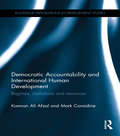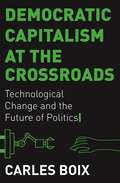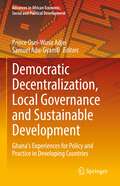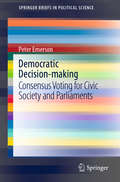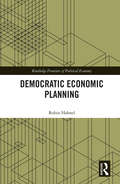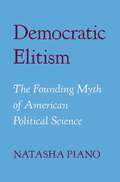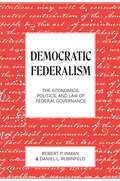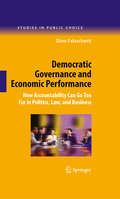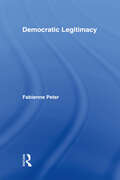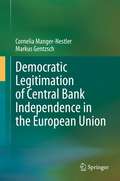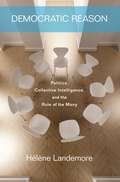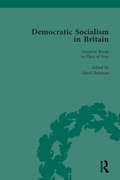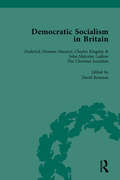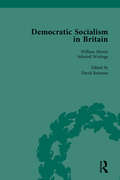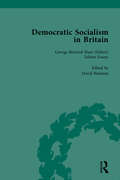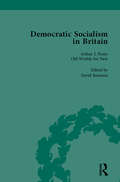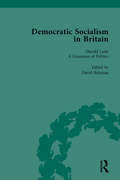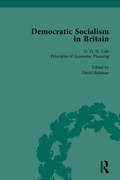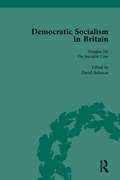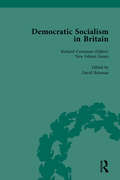- Table View
- List View
Democracy’s Detectives: The Economics of Investigative Journalism
by James T. HamiltonInvestigative journalism holds democracies and individuals accountable to the public. But important stories are going untold as news outlets shy away from the expense of watchdog reporting. Computational journalism, using digital records and data-mining algorithms, promises to lower the cost and increase demand among readers, James Hamilton shows.
Democratic Accountability and International Human Development: Regimes, institutions and resources (Routledge Explorations in Development Studies)
by Kamran Ali Afzal Mark ConsidineScholars and policymakers have long known that there is a strong link between human development and spending on key areas such as education and health. However, many states still neglect these considerations in favour of competing priorities, such as expanding their armies. This book examines how states arrive at these decisions, analysing how democratic accountability influences public spending and impacts on human development. The book shows how the broader paradigm of democratic accountability – extending beyond political democracy to also include bureaucratic and judicial institutions as well as taxation and other modes of resource mobilisation – can best explain how states allocate public resources for human development. Combining cross-country regression analysis with exemplary case studies from Pakistan, India, Botswana and Argentina, the book demonstrates that enhancing human capabilities requires not only effective party competition and fair elections, but also a particular nesting of public organisational structures that are tied to taxpaying citizens in an undisturbed chain of accountability. It draws out vital lessons for institutional design and our approach to the question of human development, particularly in the less developed states. This book will be of great interest to postgraduate students and researchers in the fields of political economy, public policy, governance, and development. It also provides valuable insights for those working in the international relations field, including inside major aid and investment organisations.
Democratic Capitalism at the Crossroads: Technological Change and the Future of Politics
by Carles BoixAn incisive history of the changing relationship between democracy and capitalismThe twentieth century witnessed the triumph of democratic capitalism in the industrialized West, with widespread popular support for both free markets and representative elections. Today, that political consensus appears to be breaking down, disrupted by polarization and income inequality, widespread dissatisfaction with democratic institutions, and insurgent populism. Tracing the history of democratic capitalism over the past two centuries, Carles Boix explains how we got here—and where we could be headed.Boix looks at three defining stages of capitalism, each originating in a distinct time and place with its unique political challenges, structure of production and employment, and relationship with democracy. He begins in nineteenth-century Manchester, where factory owners employed unskilled laborers at low wages, generating rampant inequality and a restrictive electoral franchise. He then moves to Detroit in the early 1900s, where the invention of the modern assembly line shifted labor demand to skilled blue-collar workers. Boix shows how growing wages, declining inequality, and an expanding middle class enabled democratic capitalism to flourish. Today, however, the information revolution that began in Silicon Valley in the 1970s is benefitting the highly educated at the expense of the traditional working class, jobs are going offshore, and inequality has risen sharply, making many wonder whether democracy and capitalism are still compatible.Essential reading for these uncertain times, Democratic Capitalism at the Crossroads proposes sensible policy solutions that can help harness the unruly forces of capitalism to preserve democracy and meet the challenges that lie ahead.
Democratic Decentralization, Local Governance and Sustainable Development: Ghana's Experiences for Policy and Practice in Developing Countries (Advances in African Economic, Social and Political Development)
by Prince Osei-Wusu Adjei Samuel Adu-GyamfiDrawing on field-based data and experiences from the practice of democratic decentralization and local governance over the last three decades in Ghana, this book examines whether and how democratic decentralization and local governance reforms in developing countries have produced the anticipated development outcomes.In seventeen related contributions, the authors present four relevant focal themes, including conceptual and historical trajectories of decentralization and local governance; institutional choice, democratic representation, and poverty reduction; local governance, resource capacity, and service delivery; and non-state actors, local governance and sustainable development. The book blends perspectives of scholars, practitioners, and policy-makers to provide a holistic analysis of linkages between decentralization, local governance, and sustainable development efforts, presenting a novel and useful guide for science, policy, and practice of bottom-up governance and development. It provides relevant lessons and experiences for scholars, policy-makers, and development practitioners in Africa in particular and developing countries in general.
Democratic Decision-making: Consensus Voting for Civic Society and Parliaments (SpringerBriefs in Political Science)
by Peter EmersonThis book provides a practical guide to how groups of people, everywhere, from the local village council to the United Nations Security Council, can best make collective decisions. By comparing the many voting procedures used in democratic decision-making, it explains why win-or-lose binary voting can be inaccurate and divisive, while the more inclusive preferential points system of voting can be so much more accurate and, therefore, more democratic; indeed, it is a win-win methodology. The text, essential reading for anyone interested in fair and participatory collective decision-making, also compares the most common electoral systems.
Democratic Economic Planning (Routledge Frontiers of Political Economy)
by Robin HahnelDemocratic Economic Planning presents a concrete proposal for how to organize, carry out, and integrate comprehensive annual economic planning, investment planning, and long-run development planning so as to maximize popular participation, distribute the burdens and benefits of economic activity fairly, achieve environmental sustainability, and use scarce productive resources efficiently. The participatory planning procedures proposed provide workers in self-managed councils and consumers in neighbourhood councils with autonomy over their own activities while ensuring that they use scarce productive resources in socially responsible ways without subjecting them to competitive market forces. Certain mathematical and economic skills are required to fully understand and evaluate the planning procedures discussed and evaluated in technical sections in a number of chapters. These sections are necessary to advance the theory of democratic planning, and should be of primary interest to readers who have those skills. However, the book is written so that the main argument can be followed without fully digesting the more technical sections. Democratic Economic Planning is written for dreamers who are disenamored with the economics of competition and greed want to know how a system of equitable cooperation can be organized; and also for sceptics who demand "hard proof" that an economy without markets and private enterprise is possible.
Democratic Elitism: The Founding Myth of American Political Science
by Natasha PianoA searing argument—and work of meticulous scholarship—about how American political scientists misinterpreted the elite theory of democracy and in so doing made our political system vulnerable to oligarchic takeover.Do competitive elections secure democracy, or might they undermine it by breeding popular disillusionment with liberal norms and procedures? The so-called Italian School of Elitism, comprising Vilfredo Pareto, Gaetano Mosca, and Robert Michels, voiced this very concern. They feared that defining democracy exclusively through representative practices creates unrealistic expectations of what elections can achieve, generating mass demoralization and disillusionment with popular government.The Italian School’s concern has gone unheeded, even as their elite theory has been foundational for political science in the United States. Democratic Elitism argues that scholars have misinterpreted the Italians as conservative, antidemocratic figures who championed the equation of democracy with representative practices to restrain popular participation in politics. Natasha Piano contends not only that the Italian School’s thought has been distorted but also that theorists have ignored its main objective: to contain demagogues and plutocrats who prey on the cynicism of the masses. We ought to view these thinkers not as elite theorists of democracy but as democratic theorists of elitism.The Italian School’s original writings do not reject electoral politics; they emphasize the power and promise of democracy beyond the ballot. Elections undoubtedly are an essential component of functioning democracies, but in order to preserve their legitimacy we must understand their true capacities and limitations. It is past time to dispel the delusion that we need only elections to solve political crises, or else mass publics, dissatisfied with the status quo, will fall deeper into the arms of authoritarians who capture and pervert formal democratic institutions to serve their own ends.
Democratic Federalism: The Economics, Politics, and Law of Federal Governance
by Robert Inman Daniel L. RubinfeldAn authoritative guide to federal democracy from two respected experts in the fieldAround the world, federalism has emerged as the system of choice for nascent republics and established nations alike. In this book, leading scholars and governmental advisers Robert Inman and Daniel Rubinfeld consider the most promising forms of federal governance and the most effective path to enacting federal policies. The result is an essential guide to federalism, its principles, its applications, and its potential to enhance democratic governance.Drawing on the latest work from economics, political science, and law, Inman and Rubinfeld assess different models of federalism and their relative abilities to promote economic efficiency, encourage the participation of citizens, and protect individual liberties. Under the right conditions, the authors argue, a federal democracy—including a national legislature with locally elected representatives—can best achieve these goals. Because a stable union between the national and local governments is key, Inman and Rubinfeld also propose an innovative method for evaluating new federal laws and their possible impact on state and local governments. Finally, to show what the adoption of federalism can mean for citizens, the authors discuss the evolution of governance in the European Union and South Africa’s transition from apartheid to a multiracial democracy.Interdisciplinary in approach, Democratic Federalism brims with applicable policy ideas and comparative case studies of global significance. This book is indispensable for understanding the importance of federal forms of government—both in recent history and, crucially, for future democracies.
Democratic Governance and Economic Performance
by Dino FalaschettiConventional wisdom warns that unaccountable political and business agents can enrich a few at the expense of many. But logically extending this wisdom implies that associated principals - voters, consumers, shareholders - will favor themselves over the greater good when 'rules of the game' instead create too much accountability. Democratic Governance and Economic Performance rigorously develops this hypothesis, and finds statistical evidence and case study illustrations that democratic institutions at various governance levels (e.g., federal, state, corporation) have facilitated opportunistic gains for electoral, consumer, and shareholder principals. To be sure, this conclusion does not dismiss the potential for democratic governance to productively reduce agency costs. Rather, it suggests that policy makers, lawyers, and managers can improve governance by weighing the agency benefits of increased accountability against the distributional costs of favoring principal stakeholders over more general economic opportunities. Carefully considering the fundamentals that give rise to this tradeoff should interest students and scholars working at the intersection of social science and the law, and can help professionals improve their own performance in policy, legal, and business settings.
Democratic Intergovernmental Organizations?
by Alexandru GrigorescuThis work posits that, over the past two centuries, democratic norms have spread from domestic politics to intergovernmental organizations (IGOs). Grigorescu explores how norms shaped IGO decision-making rules such as those driving state participation, voting, access to information, and the role of NGOs and transnational parliaments. The study emphasizes the role of 'normative pressures' (the interaction between norm strength and the degree to which the status quo strays from norm prescriptions). Using primary and secondary sources to assess the plausibility of its arguments across two centuries and two dozen IGOs, the study focuses on developments in the League of Nations, the International Labor Organization, the United Nations, the World Bank, the European Union, and the World Trade Organization.
Democratic Legitimacy (Routledge Studies in Social and Political Thought)
by Fabienne PeterThis book offers a systematic treatment of the requirements of democratic legitimacy. It argues that democratic procedures are essential for political legitimacy because of the need to respect value pluralism and because of the learning process that democratic decision-making enables. It proposes a framework for distinguishing among the different ways in which the requirements of democratic legitimacy have been interpreted. Peter then uses this framework to identify and defend what appears as the most plausible conception of democratic legitimacy. According to this conception, democratic legitimacy requires that the decision-making process satisfies certain conditions of political and epistemic fairness.
Democratic Legitimation of Central Bank Independence in the European Union
by Cornelia Manger-Nestler Markus GentzschThis short monograph examines the tense relationship between central bank independence and democratic legitimation, which has changed as the European Central Bank (ECB) has been entrusted with new tasks and faced unprecedented challenges. The financial and sovereign debt crisis, in particular, has affected the ECB's position within the Economic and Monetary Union without substantial changes in the Union's legal framework. However, the evolution of an institution primarily obligated to maintain price stability into an actor involved in sustaining financial stability, performing banking supervision and supporting economic policy raises the question of whether the high level of autonomy granted to the ECB is justified with regard to the principle of democracy that demands adequate accountability and control. This book identifies requirements for the democratic legitimation of central bank action in relation to specific tasks. Further, it analyses other scales of independence encountered in EU law in order to allow readers to gain a better conceptual understanding of central bank independence.
Democratic Militarism
by Jonathan D. CaverleyWhy are democracies pursuing more military conflicts, but achieving worse results? Democratic Militarism shows that a combination of economic inequality and military technical change enables an average voter to pay very little of the costs of large militaries and armed conflict, in terms of both death and taxes. Jonathan Caverley provides an original statistical analysis of public opinion and international aggression, combined with historical evidence from the late Victorian British Empire, the US Vietnam War effort, and Israel's Second Lebanon War. This book undermines conventional wisdom regarding democracy's exceptional foreign policy characteristics, and challenges elite-centered explanations for poor foreign policy. This accessible and wide ranging book offers a new account of democratic warfare, and will help readers to understand the implications of the revolution in military affairs.
Democratic Processes and Financial Markets
by William Bernhard David LeblangShows how elections, cabinet formations, and government dissolutions affect asset markets.
Democratic Reason: Politics, Collective Intelligence, and the Rule of the Many
by Hélène LandemoreIndividual decision making can often be wrong due to misinformation, impulses, or biases. Collective decision making, on the other hand, can be surprisingly accurate. In Democratic Reason, Hélène Landemore demonstrates that the very factors behind the superiority of collective decision making add up to a strong case for democracy. She shows that the processes and procedures of democratic decision making form a cognitive system that ensures that decisions taken by the many are more likely to be right than decisions taken by the few. Democracy as a form of government is therefore valuable not only because it is legitimate and just, but also because it is smart. Landemore considers how the argument plays out with respect to two main mechanisms of democratic politics: inclusive deliberation and majority rule. In deliberative settings, the truth-tracking properties of deliberation are enhanced more by inclusiveness than by individual competence. Landemore explores this idea in the contexts of representative democracy and the selection of representatives. She also discusses several models for the "wisdom of crowds" channeled by majority rule, examining the trade-offs between inclusiveness and individual competence in voting. When inclusive deliberation and majority rule are combined, they beat less inclusive methods, in which one person or a small group decide. Democratic Reason thus establishes the superiority of democracy as a way of making decisions for the common good.
Democratic Socialism in Britain, Vol. 10: Classic Texts in Economic and Political Thought, 1825-1952
by David ReismanThe texts in this collection of 10 volumes demonstrate both the diversity and continuity in British theories of democratic socialism. The selection encompasses the Ricardian socialists, the Christian socialists, and the Fabian socialists. Volume 10 includes ‘In Place of Fear’ by Aneurin Bevan.
Democratic Socialism in Britain, Vol. 2: Classic Texts in Economic and Political Thought, 1825-1952
by David ReismanThe texts in this collection of 10 volumes demonstrate both the diversity and continuity in British theories of democratic socialism. The selection encompasses the Ricardian socialists, the Christian socialists, and the Fabian socialists. Volume 2 includes contributions from .Frederick Denison, Maurice Charles Kingsley and John Malcolm Ludlow, the ‘Christian Socialists’.
Democratic Socialism in Britain, Vol. 3: Classic Texts in Economic and Political Thought, 1825-1952
by David ReismanThe texts in this collection of 10 volumes demonstrate both the diversity and continuity in British theories of democratic socialism. The selection encompasses the Ricardian socialists, the Christian socialists, and the Fabian socialists. Volume 3 includes the selected writings of William Morris.
Democratic Socialism in Britain, Vol. 4: Classic Texts in Economic and Political Thought, 1825-1952
by David ReismanThe texts in this collection of 10 volumes demonstrate both the diversity and continuity in British theories of democratic socialism. The selection encompasses the Ricardian socialists, the Christian socialists, and the Fabian socialists. Volume 4 includes the Fabian Essays, edited by Bernard Shaw.
Democratic Socialism in Britain, Vol. 5: Classic Texts in Economic and Political Thought, 1825-1952
by David ReismanThe texts in this collection of 10 volumes demonstrate both the diversity and continuity in British theories of democratic socialism. The selection encompasses the Ricardian socialists, the Christian socialists, and the Fabian socialists. Volume 5 includes ‘Old Worlds for New; A Study of the Post-Industrial State’ by Arthur J. Penty.
Democratic Socialism in Britain, Vol. 6: Classic Texts in Economic and Political Thought, 1825-1952
by David ReismanThe texts in this collection of 10 volumes demonstrate both the diversity and continuity in British theories of democratic socialism. The selection encompasses the Ricardian socialists, the Christian socialists, and the Fabian socialists. Volume 6 includes ‘A Grammar of Politics’ by Harold Laski.
Democratic Socialism in Britain, Vol. 7: Classic Texts in Economic and Political Thought, 1825-1952
by David ReismanThe texts in this collection of 10 volumes demonstrate both the diversity and continuity in British theories of democratic socialism. The selection encompasses the Ricardian socialists, the Christian socialists, and the Fabian socialists. Volume 7 includes ‘Principles of Economic Planning’ by G.D.H.Cole.
Democratic Socialism in Britain, Vol. 8: Classic Texts in Economic and Political Thought, 1825-1952
by David ReismanThe texts in this collection of 10 volumes demonstrate both the diversity and continuity in British theories of democratic socialism. The selection encompasses the Ricardian socialists, the Christian socialists, and the Fabian socialists. Volume 8 includes 'The Socialist Case' by Douglas Jay.
Democratic Socialism in Britain, Vol. 9: Classic Texts in Economic and Political Thought, 1825-1952
by David ReismanThe texts in this collection of 10 volumes demonstrate both the diversity and continuity in British theories of democratic socialism. The selection encompasses the Ricardian socialists, the Christian socialists, and the Fabian socialists. Volume 9 includes the 'New Fabian Essays' edited by Richard Crossman.

